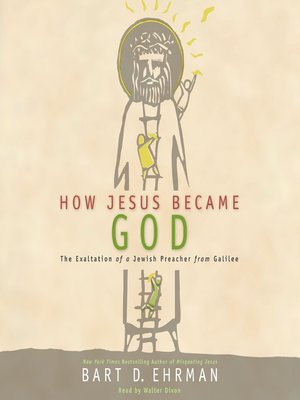

After Jesus was crucified in the year 30, his corpse was left on the cross for an unknown period of time, and was probably not given a decent burial (133-65).

He did not consider himself to be divine in any sense (86-127).
Jesus taught an apocalyptic message that the present age was about to come to an end, that the righteous would be raised to immortal life, and that in the age to come he would be an earthly, royal Messiah associated with another figure, the Son of Man. Here is a chronological schematic summary of Ehrman’s view (parenthetical page references are to Ehrman’s How Jesus Became God): The premise of his argument is that the category of divinity was an elastic one in the ancient world, even to some extent in Jewish thought, and so first-century Christians were able to entertain quite different conceptions of what it meant to regard Jesus as divine or even as “God” (a point Ehrman elaborates in two chapters, 11-84). An Overview of the Two BooksĮhrman’s thesis is that Jesus was not viewed, by himself or his disciples, as in any sense divine during his lifetime, but that belief in his divinity arose almost immediately after his disciples had visions of Jesus that they interpreted as meaning that God had raised him bodily from the dead.Īccording to Ehrman, the earliest Christians thought Jesus had been exalted by God to a divine status at his resurrection, but this belief quickly morphed, resulting in the idea that Jesus was God incarnate. Evans is also the author of what I consider the stand-out chapter responding to Ehrman. In particular, it is a shame that Craig A. Sadly, he is probably a hundred times better known than any of the five scholars who contributed to How God Became Jesus. The concurrent publication of the rebuttal book was facilitated by the fact that its publishing house, Zondervan, is owned by HarperCollins, which published Ehrman’s book under the HarperOne imprint.Įhrman, of course, has more name recognition in the English-speaking world than any other biblical scholar today, due especially to his de-conversion story (enthusiastically disseminated in the mainstream media) of abandoning evangelical Christian belief and becoming an agnostic. 

In what may be an unprecedented publishing event, a book by evangelical scholars critiquing Ehrman’s book was released at the same time yesterday, entitled How God Became Jesus. Two of the earlier, notable such books were Richard Rubenstein’s When Jesus Became God (1999) and Larry Hurtado’s How on Earth Did Jesus Become a God? (2005). Bart Ehrman’s book How Jesus Became God, released just yesterday, is the most recent example of a scholarly tradition of books with similar titles offering to explain how Christianity turned a simple itinerant Jewish teacher into the Second Person of the Trinity.








 0 kommentar(er)
0 kommentar(er)
